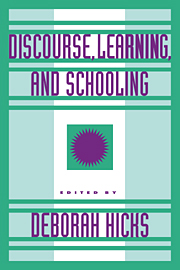1 - Introduction
Published online by Cambridge University Press: 03 May 2010
Summary
It is no secret to teachers and other educators who work with children that there is an intimate relationship between language, learning, and schooling. Indeed, one of the astounding achievements of children in the preschool years is their mastery of language. By the time children enter school, at the age of 5 or 6, they are masterful users of one, sometimes two, languages. Children in kindergarten or first grade control the use of a highly complex grammatical system, so complex that some linguists have maintained that some, if not all, aspects of this system must be part of the child's initial cognitive structures, present at birth and activated through exposure to language in use (Chomsky, 1982; Pinker, 1984). And yet, there is another aspect of children's language competency that has in past decades intrigued educators, psycholinguists, and anthropologists. From the earliest moments of language use, when children are using language to accomplish cognitive tasks such as labeling or requesting (see Bruner, 1983), they are participants in discourse contexts, which involve specific social usages of language. Thus, by the time they enter a system of formalized schooling, children are also adept at “doing things with words.” Through recurrent participation in social activities at home and in certain “proximal” institutional settings (e.g., day-care centers, churches), children are cognitively apprenticed (Rogoff, 1990) into ways of using language that makes sense within particular social settings and particular cultures.
Information
- Type
- Chapter
- Information
- Discourse, Learning, and Schooling , pp. 1 - 26Publisher: Cambridge University PressPrint publication year: 1996
Accessibility standard: Unknown
Why this information is here
This section outlines the accessibility features of this content - including support for screen readers, full keyboard navigation and high-contrast display options. This may not be relevant for you.Accessibility Information
- 3
- Cited by
